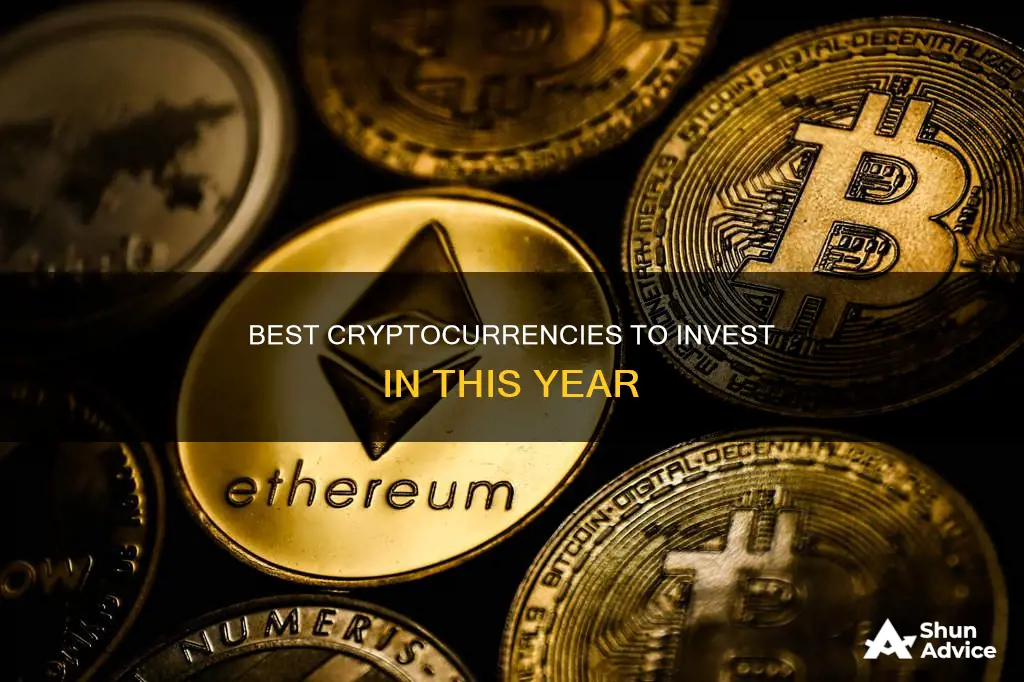
Cryptocurrencies are digital currencies that are not backed by tangible assets or securities. They are traded between consenting parties with no broker and tracked on digital ledgers. The most well-known cryptocurrency is Bitcoin, which was created in 2009 and remains the most valuable. Since then, the market has expanded to include countless coins, with thousands available to trade and invest in.
The crypto market is known for its volatility, but it has also generated incredible gains for long-term investors. While there are thousands of cryptocurrencies on the market, Bitcoin and Ethereum still dominate, comprising about 71% of the $1.99 trillion global crypto market.
Other top cryptocurrencies by market cap include Binance Coin, Solana, Ripple, Dogecoin, Tron, Toncoin, Cardano, and Avalanche.
Investing in cryptocurrency is high-risk, and it's important to do your research before getting involved in the market.
What You'll Learn
- Bitcoin: the original cryptocurrency, with the largest market cap and strong liquidity
- Ethereum: a blockchain-based platform with smart contracts functionality, and the second-largest market cap
- Binance Coin: the native token of the Binance exchange, with a range of use cases
- Solana: a cheaper and faster alternative to Ethereum, with a unique hybrid proof-of-stake and proof-of-history verification system
- XRP: the native cryptocurrency of the Ripple network, an alternative to the SWIFT system for international money transfers

Bitcoin: the original cryptocurrency, with the largest market cap and strong liquidity
Bitcoin (BTC) is the original cryptocurrency, created in 2009 by Satoshi Nakamoto. It is also the largest by market capitalization, with a valuation of about $1.3 trillion, or roughly 53% of the overall market.
Market capitalization is an important metric in the world of cryptocurrencies. It is used as an indicator of the dominance and popularity of a given cryptocurrency. The metric is calculated by multiplying the current price of a coin by its circulating supply. The higher the market cap, the more dominant the coin is considered to be.
Bitcoin's mainstream acceptance is greater than that of any other cryptocurrency. This is evidenced by the January debut of 11 new Bitcoin exchange-traded funds (ETFs). The fight for approval of spot Bitcoin ETFs took years, but the approval has opened a new chapter for the leading crypto. Now, mainstream investors can track Bitcoin's performance without directly owning the "digital gold" itself.
Bitcoin's price has skyrocketed as it has become a household name. In May 2016, one bitcoin was worth about $500. As of September 3, 2024, a single bitcoin was worth around $59,125. That is a growth of 11,725%.
Bitcoin does have liquidity, but it is much less than that of the currency trading market. Liquidity is essential for any tradable asset, including Bitcoin. Liquid markets are deeper and smoother, while illiquid markets can put traders in difficult positions.
Bitcoin's average 24-hour trading volume was between $9 billion and $100 billion in the first few months of 2024. For comparison, the average turnover in the forex market was about $7.5 trillion daily in 2022. This is a significant amount of liquidity.
The daily volume of Bitcoin was under $100 million per day in 2014 and sometimes fell below $10 million. In December 2017, the daily volume hit more than $2 billion but fell below $1 billion in January 2018. Since then, Bitcoin's volume has mostly stayed below $1 billion, with rises over that amount corresponding to significant events in the cryptocurrency space.
The increased acceptance of Bitcoin at brick-and-mortar stores, online shops, and other businesses can help boost its liquidity. The more it is used as a medium of exchange, the more liquid Bitcoin becomes.
Bitcoin ATMs are also important for wider acceptance because they facilitate the buying of Bitcoins. Many people are uncomfortable with online exchange transactions, so these ATMs are a great resource. However, this purchase mode may be much more costly than online exchanges.
In summary, Bitcoin is the original and most dominant cryptocurrency. It has strong liquidity, which is essential for any tradable asset. Its price has skyrocketed in recent years, and it has become a household name.
Bitcoin: Should You Invest?
You may want to see also

Ethereum: a blockchain-based platform with smart contracts functionality, and the second-largest market cap
Ethereum: Blockchain-Based Platform with Smart Contracts Functionality
Ethereum is a blockchain-based platform that supports smart contracts and decentralised finance tools. It is the second-largest cryptocurrency by market cap, currently valued at about $300 billion and accounting for nearly 18% of the total cryptocurrency market.
Ethereum's native token, Ether, is used to pay for transactions and fees on the network. Unlike Bitcoin, which only functions as a speculative asset and a store of value, Ether has inherent utility as the native token of a widely used network.
Smart Contracts
Smart contracts are a type of Ethereum account that follows "if this, then that" logic. They are computer programs stored on the blockchain and are guaranteed to execute according to the rules defined by their code, which cannot be changed once created. Smart contracts are self-executing and are deployed to the network, running as programmed. They can be used to replace intermediaries in many industries, such as brokers in property transactions.
Advantages of Smart Contracts
Smart contracts offer predictable outcomes and remove the need for trusted intermediaries. They are transparent and can be checked by anyone before signing. They also protect your privacy, as transactions are tied to a unique cryptographic address rather than your identity.
Limitations
Smart contracts cannot retrieve data from off-chain sources, which means they cannot respond to events in the real world. There is also a maximum contract size of 24KB.
Creating Smart Contracts
Smart contracts are written in developer-friendly languages such as Solidity and Vyper. They are compiled and converted into bytecode, which is then stored on the blockchain. An address is assigned to the contract based on the creator's address and the number of transactions they have sent.
Other Features of Ethereum
Ethereum has recently switched from the energy-inefficient proof-of-work protocol to the more efficient proof-of-stake system, giving it an advantage over Bitcoin in an environmentally conscious world.
Investing in Ethereum
Ethereum has experienced tremendous growth. From April 2016 to September 2024, its price went from about $11 to around $2,505, an increase of over 22,000%.
However, it is important to remember that cryptocurrencies are incredibly volatile and not suitable for all investors.
Turkey's Bitcoin Investment Guide: Getting Started
You may want to see also

Binance Coin: the native token of the Binance exchange, with a range of use cases
Binance Coin (BNB) is the native token of the Binance exchange, which is one of the largest cryptocurrency exchanges in the world. Binance offers crypto-to-crypto trading in more than 350 cryptocurrencies and virtual tokens, including Bitcoin, Ethereum, Litecoin, Dogecoin, and its own coin, BNB. Binance Coin was launched in 2017 and has since expanded its use cases beyond discounted trading fees on the Binance exchange.
Use Cases of Binance Coin
- Trading Fees: BNB can be used to pay for transaction fees on the Binance exchange, including Binance.com, Binance DEX, and Binance Chain.
- Payments: Binance Coin can be used for payments at various merchants, including Monetha and HTC.
- Travel Bookings: BNB can be used to book travel accommodations at sites such as TravelbyBit, Trip.io, and Travala.com.
- Entertainment: Binance Coin can be used to buy music, game rewards, and other entertainment services.
- Online Services: BNB can be used to pay for online services such as BitTorrent, Canva, and Storm.
- Financial Services: Binance Coin can be used for financial purposes, such as taking out loans at ETHLend or making investments at Moeda.
- Launchpad Program: One can use BNB to invest in certain ICOs listed through Binance's Launchpad program, which provides a seamless marketplace for trading in established and new virtual tokens.
- Non-Fungible Tokens (NFTs): Binance users can trade, stake, and loan NFTs on the Binance NFT marketplace.
Market Performance of Binance Coin
Binance Coin has experienced significant growth since its launch in 2017. As of late September 2024, its price had risen to around $535, representing a gain of over 500,000% since its initial offering price of $0.10. As of May 2024, BNB was the fourth-largest cryptocurrency by market capitalization, with a market cap of over $87 billion.
Binance Coin Burning
It is worth noting that Binance regularly engages in Binance Coin burning events. Every quarter, the company uses one-fifth of its profits to repurchase and permanently destroy (burn) BNB held in its treasury. This mechanism helps control the supply of BNB and can potentially increase its value over time.
In summary, Binance Coin is the native token of the Binance exchange and has a wide range of use cases beyond discounted trading fees. Its strong performance and growing list of use cases make it an attractive option for investors, although it is important to carefully consider one's risk tolerance and investment goals before making any decisions.
Investing in Dogecoin: How Much Money is Needed?
You may want to see also

Solana: a cheaper and faster alternative to Ethereum, with a unique hybrid proof-of-stake and proof-of-history verification system
Solana is a blockchain platform that facilitates decentralised app (dApp) development and supports cryptocurrency transactions. It is a cheaper and faster alternative to Ethereum, with a unique hybrid proof-of-stake and proof-of-history verification system.
Solana's proof-of-history (PoH) and proof-of-stake (PoS) consensus mechanisms set it apart from other blockchains. PoH is the main element of the Solana protocol, responsible for the majority of transaction processing. It records successful operations and the time elapsed between them, ensuring the trustless nature of the blockchain. The PoS mechanism acts as a monitoring tool for the PoH processes, validating each sequence of blocks it produces. This combination of two consensus mechanisms makes Solana a unique approach in the blockchain industry.
Solana's protocol is designed to serve both small-time users and large institutions, with a commitment to low transaction costs while still ensuring scalability and fast processing. It claims to be able to support 50,000 transactions per second without sacrificing decentralisation.
Solana's native token, SOL, powers the platform. When it launched in 2020, SOL's price started at $0.77. By late September 2024, its price was around $134.33, a gain of 17,346%. As of September 2024, Solana is the fourth-largest cryptocurrency in the world, excluding stablecoins, with a market capitalisation of around $76 billion.
Solana has attracted a lot of attention to its platform through the popularity of Solana meme coins, which are easy and cheap to create and trade. It also has a thriving ecosystem, with a range of decentralised applications, or dApps, being built on the platform.
Overall, Solana offers a cheaper and faster alternative to Ethereum, with its unique hybrid proof-of-stake and proof-of-history verification system making it a compelling option for those seeking efficient blockchain solutions.
Best Crypto Investment Options: Which Coins to Buy?
You may want to see also

XRP: the native cryptocurrency of the Ripple network, an alternative to the SWIFT system for international money transfers
XRP is the native cryptocurrency of the Ripple network. It was created by some of the same founders as Ripple, a digital technology and payment processing company. XRP can be used on the Ripple network to facilitate exchanges of different currency types, including fiat currencies and other major cryptocurrencies.
Ripple is a global payments network designed for institutional use. It offers an alternative to the SWIFT system traditionally used by banks and other financial institutions for international money transfers. The Ripple network claims to be superior to SWIFT because it facilitates faster, cheaper, and more secure transactions.
XRP has had a strong year-over-year return of 132% as of September 2024. Its market cap is currently $31 billion, and its price has risen by 9,377% since the beginning of 2017.
XRP is available to trade on Uphold, one of the few exchanges that allows users to trade XRP, along with DOGE and more.
XRP scored a partial court win over the SEC in 2023 when a judge ruled that XRP is "not necessarily a security." However, Ripple is still facing a nearly $2 billion fine from the SEC concerning alleged XRP sales to institutional clients.
Ape Coin: Worthy Investment or Just Hype?
You may want to see also
Frequently asked questions
Some of the most popular cryptocurrencies to invest in are Bitcoin, Ethereum, Binance Coin, Solana, and Cardano.
When choosing a cryptocurrency to invest in, it is important to consider factors such as market capitalization, trading volume, liquidity, use cases, and real-world adoption.
You can buy cryptocurrencies through crypto exchanges such as Coinbase, Kraken, or Gemini, or through apps such as Cash App. You can also invest in cryptocurrencies through financial derivatives, such as CME's Bitcoin futures, or through other instruments such as Bitcoin trusts and ETFs.
Cryptocurrencies are considered high-risk investments due to their extreme volatility and unpredictability. There is also the potential for scams and fraud, as well as growing regulatory scrutiny and the possibility of government bans.
Cryptocurrencies offer the potential for high returns and can be used as an alternative to traditional fiat currencies. They are decentralized, which means they don't require a bank to complete transactions, and they often have supply restrictions in place to limit dilution.







